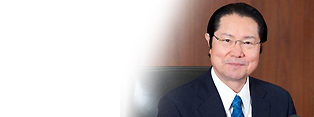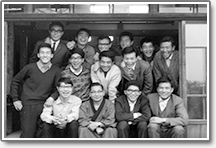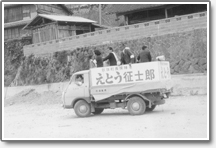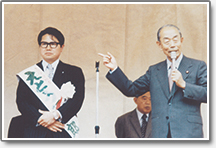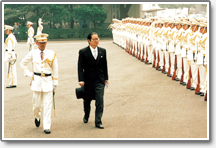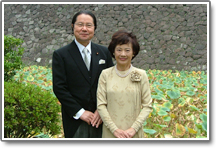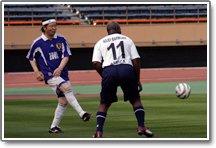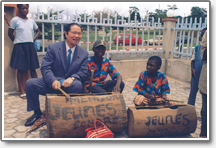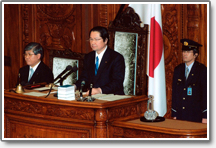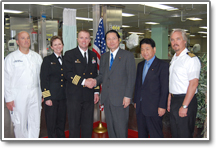Seishiro Eto was born on 29 April 1942 in Oita Prefecture, on Kyushu Island. His parents were farmers and he was their third son. His home was located in Hiju Village, a very small and extremely rural village nestled in a highland valley in Central Oita Prefecture. Transportation within the village was by animal drawn cart and transit between the villages was either by cart, by horse or on foot. The nearest town, Kusu, was several hours away by cart over bumpy, dirt roads. Traveling was difficult especially because these dirt roads were impassable during certain times of the year. The "short cut", by foot, took four hours and required the traveler to traverse mountains, forests, and fields. Today, due in large part to Mr. Eto's efforts, the transportation between Hiju and Kusu is fifteen minutes along scenic and modern thoroughfares, which dramatically improved the village's access to other parts of the region, |
 |
During the late 1940’s, schooling in the region was limited. At the age of eight, after considerable attempts, Seishiro persuaded his parents that the small Hiju elementary school was not able to satisfy his intellectual curiosity and could not provide him with the education he needed. To this end, beginning with third grade, he enrolled in the elementary school in the next closest town, Kusu. As Kusu was four hours away by foot and there was no public transportation between the village and town, he boarded in the Kusu Elementary School. Every Saturday after school, the young Seishiro made the long trek home for the short weekend. Laden with the week's provisions and fresh laundry, he would retrace his steps to school again in the early hours of Monday morning. Since he was responsible for his own cooking, washing, and cleaning during the week, he learned self-sufficiency at an early age. |
 |
Seishiro continued his education at a nearby town until he was in middle school. During that time, he realized that the lack of good roads and public conveyances was not only very inconvenient to the villagers but also detrimental to the village's growth and prosperity. When he was ten years old Seishiro Eto decided that he wanted to do something about this situation. He decided that the best way to improve the roads, the transportation system, and hence the quality of life for the people in his village was to become a politician. He thought that politicians could help generate change and so, he used this as motivation for his future career vision. |
 |
By the time Seishiro was in high school, the family had five sons. With his parents struggling because of a lack of finances, he felt he needed to suspend his schooling to help support his parents and family. He moved back home from the near by town and began to work. To make the sorely needed extra income, Seishiro made charcoal out of trees he harvested and cultivated Shitake mushrooms. After working for two years, he resumed with his schooling and entered high school with students two years his junior in age. He graduated from high school in 1962. |
|
Following high school, he was still focused on his career goal of becoming a politician. He applied for and was accepted into Waseda University's prestigious School of Political Science and Economics. Since his family would not be able to support his college tuition or living expenses, Seishiro worked his way through school with part time jobs and scholarships. At that time in Japan, it was very unusual for a student to put himself through college, especially such a prestigious institution. In order to pay for the expenses, he held various jobs as a driver. He graduated in 1966 with a degree in Political Science. |
 |
In
1970, after his many years of preparation, Seishiro returned to his hometown
of Kusu with the anticipation of finally entering politics. He wanted to
run for Mayor of Kusu and began his political activities. The skeptics ridiculed
him because they thought that he was too young and inexperienced. Seishiro
listened to his detractors and believed that the best way for him to prove
them wrong was to get his message out to the people. He organized over several
hundred grass roots, town hall style meetings where he explained his philosophy
and positions. Once the constituents had a chance to meet with him and to
understand his message, they quickly became his supporters. In 1971, at the
age of twenty-nine, he was elected as the Mayor of Kusu Town. At the time
of his election, he was the youngest mayor ever elected in Japanese history. |
 |
To further prepare himself for a future as a politician, Mr. Eto knew that he needed practical experience from the national perspective; he therefore sought and was accepted as a Staff member in a Diet Member's office in Tokyo. He worked his way up to a senior staff position ("Secretary"). He also joined various organizations promoting political exchange and understanding. In addition, he felt that Japan would have an increasingly important role in the world not only economically but also as a country that could promote democracy and peaceful solutions to conflict. Upon realizing Japan’s potential, he arrived to the conclusion that he needed to become involved in organizations that promoted his perceptions in order to prepare himself for a leadership role in Japan's bright future in the 21st Century. He soon involved himself in the Youth Committee for creating International Leaders. He was elected their President and ran the group's conference on International Youth activities. |
 |
As a young mayor, Mr. Eto was acknowledged both inside and outside the Prefecture for his intelligence, his ability to get things done quickly, and his capability to fulfill his commitments to his constituents. His talents quickly attracted the attention of the local leaders of the Prefecture Liberal Democratic Party (LDP). They decided to run him as the opposition party candidate to the incumbent in the Oita Prefecture Upper House (House of Councillors) elections. Mr. Eto ran a strong and hard fought campaign, and at the age of thirty-six, he entered Politics on the National level. He was successful in his bid for the House of Councillors. |
 |
In 1983, upon completing his term in the House of Councillors, Mr. Eto ran for the Oita Prefecture 1st District House of Representatives Seat. (He is currently a member of the 2nd District House of Representatives.) He was successful and in 1983, he entered the House of Representatives. Mr. Eto has been elected for thirteenth consecutive terms to the House of Representatives. |
 |
Education:
Career:
|

